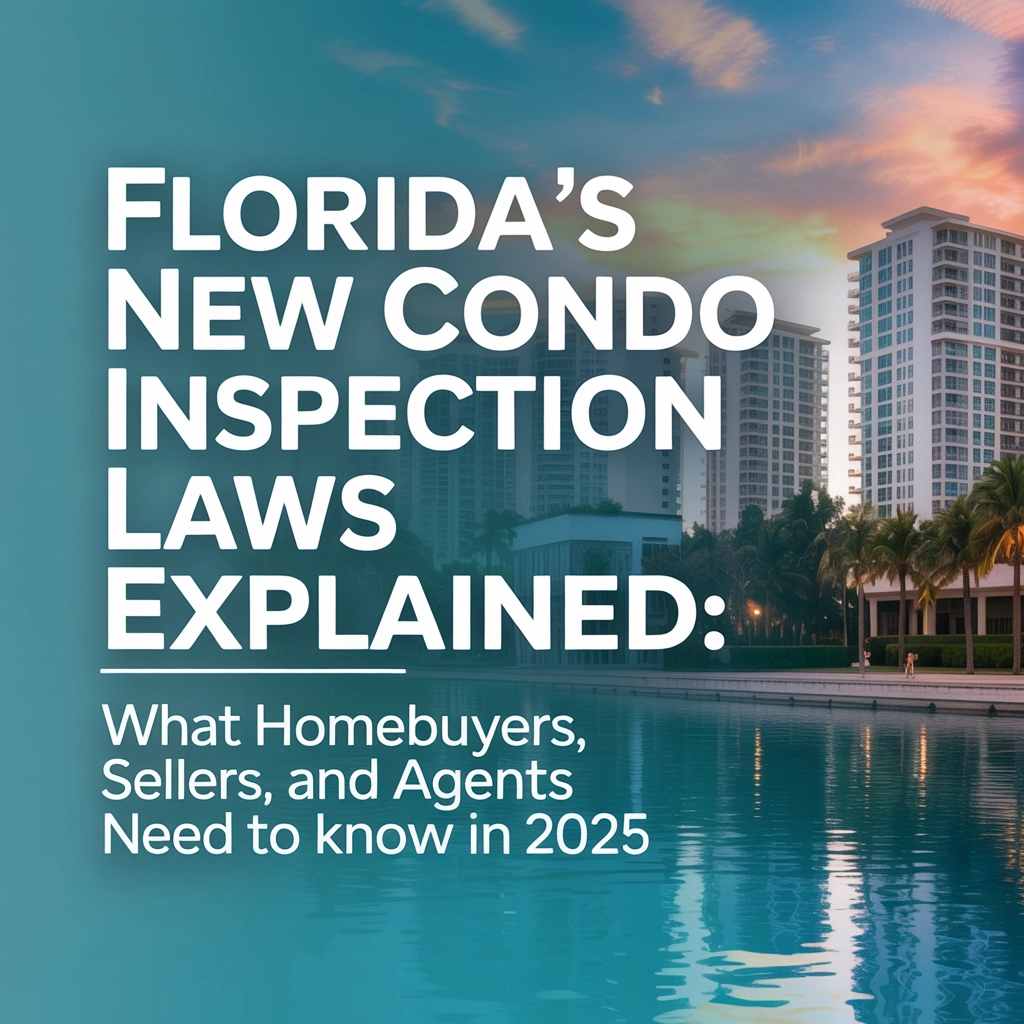
Florida’s condo scene looks very different in 2025—especially if you’re buying, selling, or representing clients in the condo world. Whether you’re a real estate agent, unit owner, or first-time buyer, the new laws that went into effect this year have redefined what it means to own, manage, or purchase a condominium in the Sunshine State.
These reforms are Florida’s response to the tragic Surfside condominium collapse in 2021, and they aim to create a safer, more transparent system for everyone involved. It’s a big change for the industry. Here’s a breakdown of what you need to know.
Why the Change? (A Brief Look Back)
The catastrophic Surfside collapse woke everyone up to the risks posed by aging buildings and unclear maintenance standards. Lawmakers moved quickly, realizing that many condos across Florida were not being regularly inspected, leading to potentially dangerous situations.
Legislation passed in 2022 and revised through 2025 brings tighter regulations to condo inspections, reserves, disclosures, and day-to-day governance—directly addressing those safety and transparency gaps.

The Milestone Structural Inspection: Your New “Must-Have”
Who Needs to Worry:
If you own, manage, or plan to buy/sell a unit in any South Florida condo building that’s got three or more habitable stories, these new rules apply to you.
What’s Required:
- Milestone inspections are now the law.
- Any condo 3 stories or taller must undergo a structural inspection at set ages.
- Within 3 miles of the coastline: First inspection when the building is 25 years old.
- All inland buildings: First inspection at 30 years old.
- After that: Every 10 years, like clockwork.
Why?
These inspections aim to catch structural issues before they become big (and expensive or dangerous) problems. Qualified engineers or architects evaluate the integrity of the foundation, load-bearing walls, roofs, and major building systems. The inspection covers both visual checks and deeper evaluations if issues are suspected.
How This Impacts Buyers, Sellers, and Agents:
- Buyers: You now have assurance that aging buildings are being checked on schedule.
- Sellers: Before listing, you’ll need up-to-date documentation on completed inspections.
- Agents: This is non-negotiable—be ready to explain the requirements and consequences of noncompliance to your clients.
Reserve Funding & Financial Health: No More Kicking the Can
A key part of condo safety is knowing there’s money in the bank for repairs. New laws require:
- Structural Integrity Reserve Studies (SIRS):
- These are detailed reports evaluating key structural elements and how much the association should set aside to keep things safe.
- All qualifying buildings need a current SIRS.
- Associations can no longer waive or underfund reserves for essential repairs.
- Reserve funding must match or exceed SIRS recommendations.
- Budget transparency: Owners, buyers, and agents must be able to see if an association is staying solvent.
Effect on Transactions:
Sellers must disclose the status of both milestone inspections and reserve studies. If reserves aren’t adequate, buyers can walk away—or negotiate for repairs or price drops.

New Buyer Protections & Extended Review Time
Florida really ramped up consumer protections with these laws.
Longer Review Periods
- Before 2025, buyers had only three days to review essential documents after signing a condo contract.
- Now: Buyers get seven days (excluding weekends and legal holidays) to examine key documentation. This gives you more time to understand what you’re buying and to seek advice or walk away if issues pop up.
Mandatory Disclosures
- Sellers must proactively tell buyers whether the required inspections and reserve studies have been completed—and what they found.
- Expect buyers to ask for milestone inspection reports, SIRS summaries, detailed budgets, insurance info, and any current repair or special assessment notices.
What This Means in Practice:
- Agents: You’ll need to help both buyers and sellers track and provide a larger volume of documents.
- Buyers: Use your extra time wisely—double-check financials, inspection results, and meeting minutes.
- Sellers: Start gathering your paperwork early; incomplete files can kill deals fast.
For more tips on what to review and how to prepare, check out our complete condo inspection checklist.
Association & Governance Overhauls: Modernizing Operations
These laws didn’t just target building safety—they also modernize how condo associations operate:
More Official Records
- Associations must retain detailed financial records: monthly statements, ledgers, even affidavits and video recordings of virtual meetings.
- Board minutes: Now posted online within 30 days and kept available for at least 12 months.
- Buyers and owners have improved access to info—transparency is the name of the game.
Virtual Meetings & Electronic Voting
- Associations can hold meetings via video conference, so more owners can participate.
- Virtual attendees can vote, but their attendance doesn’t count toward a quorum.
- All virtual meetings must be recorded and kept for one year.
- If 25% of owners want to implement electronic voting, the board is now required to offer it.
Why This Matters:
This moves Florida condos into the digital age, makes governance more transparent, and allows for better participation—especially for snowbirds and second-home owners.

Your 2025 Timeline: Key Deadlines to Remember
- January 1, 2025: Milestone inspections and reserve study rules officially in effect. All buildings 30+ years (inland) and 25+ years (coastal) must be scheduled for inspection.
- July 1, 2025: Governance changes take effect (record-keeping, meeting rules, etc.).
- Ongoing: Every 10 years after the milestone, new inspections are due. Associations must keep updating and funding reserves as studies recommend.
The Bottom Line: What You Need to Do Now
For Homebuyers
- Ask for the building’s most recent milestone inspection and SIRS.
- Use your seven-day review period to check for red flags—don’t rush an offer.
- Look over meeting minutes, budgets, and upcoming repair assessments.
For Sellers
- Gather and organize all mandatory documents before listing.
- Be transparent. Disclose everything related to inspections and finances.
- Work with your association and a trusted real estate agent to ensure compliance.
For Real Estate Agents
- Stay educated—these rules are complex and fines for noncompliance are steep.
- Help your clients (on both sides) understand the legal landscape and what paperwork is required.
- Guide buyers on making smart decisions and avoiding risky buildings.
For Condo Associations
- Keep inspection and reserve study schedules up to date.
- Maintain detailed, accessible records (and get your website ready for document posting).
- Be proactive about repairs to avoid costly last-minute fixes and special assessments.
For details about our expert condo inspections and assessments, visit Infinity Inspection Services.
Need Help Navigating the New Laws?
The 2025 changes to Florida condo law are comprehensive, and mistakes can be costly. At Infinity Inspection Services, we specialize in helping Floridians—unit owners, buyers, sellers, and agents—understand and comply with these new requirements. We provide trusted, thorough inspections, and clear documentation that meets state law.
Want to talk to an expert or schedule an inspection? Contact us today.
Resources & Further Reading:
- Infinity Inspection Services Blog
- Four-Point Inspection: What It Is and Why You Need One
- Inspection Tips for Florida Homebuyers
Stay safe, stay informed, and welcome to a new era in Florida condo ownership!
